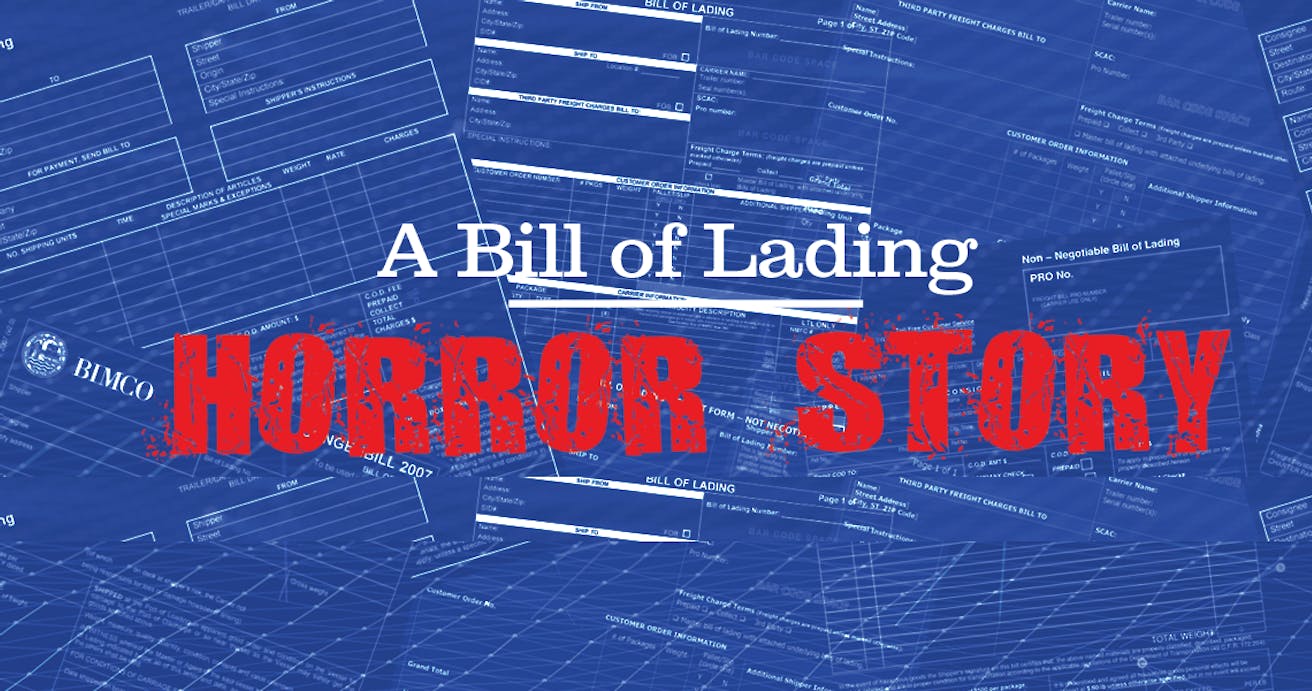
Horror story: It is SO expensive to lose a bill of lading (B/L)!
The bill of lading is a powerful document. Why wouldn’t it be? After all, the concept of a paper ledger of a ship’s load has ruled for more than 600 years and people have grown extremely used to it! But nobody ever gets used to what happens if the bill of lading does not arrive …
So, what happens if the B/L does not arrive?
This is exactly what happened to the experienced Mrs. X, who works at an import company in Slovenia. The company, acting as a consignee, imports upholstery fabric and leather from China. The manufacturer, acting as the shipper of goods, had arranged the shipment through one of the leading global shipping lines, and the payment had already been made through the banks.
But on the day when she expected the bill of lading to arrive, it simply never showed up. So she just asked where it was and was assured by the document courier that it would arrive.
Only - it didn’t.
“It’s funny, but my team attended a presentation of the CargoX Smart B/L with our CEO. The event was organized by our bank, looking into new technologies. We loved the idea of a blockchain bill of lading and we were wondering what could be done if a B/L goes missing during shipment,” Mrs. X. explains. “A colleague of mine commented that it had better not happen to us, as she heard things might get very expensive!”
She inquired again, and again, and again. The tracking showed the document as stuck at one of the last courier checkpoints, but they couldn’t find it.
Houston, we have a problem!
“I can remember the exact moment when I got sick to my stomach, this much I can tell you! I just remembered that CargoX presentation, thinking that this would never have happened to us if we used CargoX’s blockchain bill of lading! I just remembered my colleague’s words - if you lose a paper bill of lading, it can become extremely expensive!” she laughs, looking back at the mishap.
The shipping line representative explained to her that she could not receive a duplicate, as the original document was already issued. And the release agent told her that they cannot release the goods without the document, even if they are a trusted customer. They would need to receive the deposit in the full value of the goods, and an additional 200% on top of that, just in case somebody else came in their name and claimed the goods with a valid bill of lading. And the consignee’s bank would have to cosign on the company’s liquidity to cover any additional expenses if that other potential person would demand the ship to stop until the case was rightfully resolved.
As their container was halted because of the missing B/L, the other two shipments in the container were also blocked, even if the consignee presented the bills of lading for them.
What happened then?
The ship was unloaded to continue sailing, and the container was kept at the terminal to be claimed when the proper bills of lading were presented. The company was charged daily demurrage costs, the due amount increasing day by day. As things stood, their shops had to wait for their goods. They luckily had enough stock for a couple of months in advance - but what if they had not?
In the end, there was no dramatic ending and they did not have to provide a legal basis for B/L revocation (that would be a whole different story!). The missing bill of lading was delivered miraculously after a 3-week delay - just like nothing happened.
We can only assure everybody was happy, especially Mrs. X. She will remember the story forever, and now her company will only use digital bills of lading in the future (whenever possible) - of course through the CargoX platform!
Some advice from CargoX
In the event of a lost bill of lading, you cannot simply request a new document. A court order may need to be secured to advise the shipping line to deliver the goods to the holder of the title of the goods, based on a surety bond given.
Place an ad in the designated press about the loss or nullification of the original document.
Be persistent, and provide proof to the shipping line - as they can issue a duplicate under special conditions.
The shipping line should receive a letter of indemnity, sometimes co-signed by a bank, which releases the carrier from liability under the terms of the original outstanding bill. Reasonable costs and legal fees may apply.
Protect yourself by using CargoX’s quick and secure Smart B/L! See how it works …
-----------------
NOTE: This account is based on true events, but it has been anonymized to protect the involved companies names.